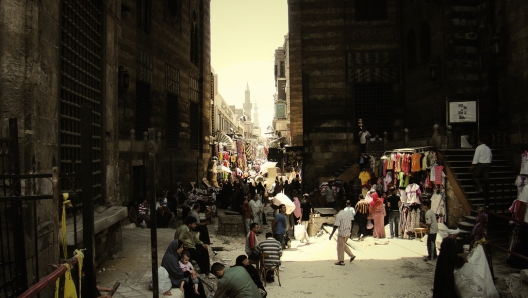 Having lived in a densely populated nation for decades, Egyptians seem to have come to terms with congestion and overcrowding. This has led to a lack respect for personal space; that physical space no one should dare enter. In Egypt, bold examples of this exist – from the microbus driver, who insists on cramming four passengers into a space that can hardly seat three, to a sweet mother-in-law who interferes in the choice of everything, down to your bathroom tiles.
Having lived in a densely populated nation for decades, Egyptians seem to have come to terms with congestion and overcrowding. This has led to a lack respect for personal space; that physical space no one should dare enter. In Egypt, bold examples of this exist – from the microbus driver, who insists on cramming four passengers into a space that can hardly seat three, to a sweet mother-in-law who interferes in the choice of everything, down to your bathroom tiles.
As a result, you can’t help but notice an eagerness to acquire the largest possible amount of personal space, even if it comes at the expense of others. This is evident in a number of misguided proverbs upon which we have been raised for decades: “To each his own,” “Good fences make good neighbors,” and “Hedges between keep friendships green.”
Quite simply, these sayings encourage the mindset of keeping to and relying on yourself, because everyone around you is ready to attack your personal space. But this ‘colonial empire’ has already been compromised in many ways. In fact there exists an unwritten rule granting you the right to forcibly invade the privacy of others, and an understanding that hidden secrets are bound only to make a fool out of you.
This atmosphere is fertile ground for societal ills like the limiting of freedom of expression and speech. These are the very freedoms that keep people connected, and allow them to educate each other through interaction, leading to an increased state of enlightenment.
Living in small, congested space is akin to life led as a cog in the machine, or a donkey turning a water wheel. It kills all forms of creativity and inventiveness, keeping ones expectations in life as low as possible. It leaves one programmed to believe that this is the best life has to offer; That those ‘maniacs’ fighting for more space are traitorous, and aid the enemy, exposing us to unnecessary dangers that we are not prepared to face.
The perfect example of the collapse of personal space and the power of words and expressions, in a nation that prides itself on its “religious by nature,” is sexual harassment. The phenomenon has become all too common in the country in the past few years.
While there is no shortage of those who make excuses for the aggressor and blame the victim, using words of wisdom about religion, a few young, brave women were able to speak about their experiences behind closed doors. They grew in number, inviting other women and offering a space to all to speak about their own painful experiences. They detailed the harassment of strangers, and the anger and reproach of fathers and brothers who blamed them rather than offering compassion and shelter.
Soon enough, these small spaces could not confine their angry voices, which flowed out into the street, creeping out from beneath doors and through the openings of vents, where their neighbors could hear them, trying at first to ignore those loud and angered cries for justice. They tried to stop their own daughters from listening, but failed, as the voices gave more young ladies the strength and courage to express themselves. Soon enough they emerged into the streets, facing a society that had no choice but to recognize and interact with them. At this point, the media too offered space for the discussion of this phenomenon. It has finally culminated into organized groups who have come together in crowded areas to monitor and prevent harassment, and for the first time in years, we have seen scores of cases files against offenders, many of whom have been convicted.
Living in a small space, avoiding interaction is no way to live life. We can no longer fight fearfully in the dark for what is rightfully ours. The world is limitless and we need its space and fields of expression to know what is happening around us, so that we can call for a change on the foundation of our faith and convictions.
Mohammad Tolba founded the Salafyo Costa Movement in April 2011. He writes a weekly column for Egyptian daily, al-Youm al-Saba’a, and his first book is to be published in the coming months, detailing his experiences in Sudan, and the challenges he has faced as an Egyptian Salafi citizen.
Image: Photo: Nancy Messieh
